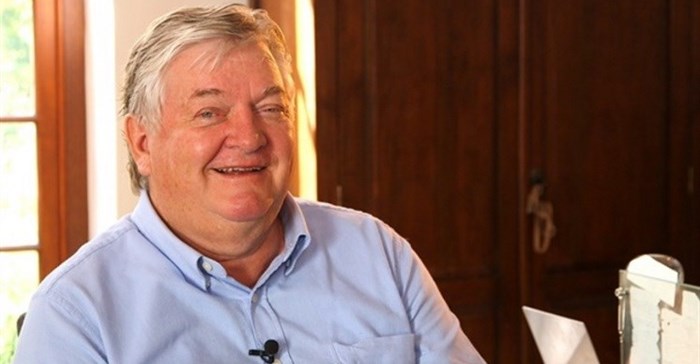
At Shoprite's AGM in late October 2016 Wiese again jumped to the defence of Basson's remuneration package. This time he told testy investors, who'd questioned the R100m (including a cash bonus of R50m) paid to Basson in 2016, "I would have been happy to pay him much more."
Shoprite's recent shocking Sens announcement about Basson's Put option is proof that Wiese was not exaggerating. Far from it. It seems Wiese actually understated the generosity he (on behalf of his shareholders) was prepared to heap upon Basson, who retired from the group in December. The Sens announcement released last Friday revealed the existence of a remarkable and hitherto unheard-of employment agreement that obliged Shoprite to repurchase any shares put to it by Basson.
A few days earlier, on 2 May, Basson notified Shoprite that he was exercising the put option at the middle market price of R211. It turns out this was a five-year high for the share.
If shareholders approve the transaction, Shoprite will have to repurchase 8.7m of Basson's shares at this price, which means handing over R1.8bn to the man who is largely responsible for building the group into the largest food retailer in Africa. Wiese's comment about being happy to pay Basson so much more will come back to haunt shareholders as they face an eye-popping R144m/year in additional interest costs to fund his generous gesture.
Some analysts have expressed concern that Basson's decision to sell all but 400,000 of his Shoprite shares is an indication that he believes the group is now ex-growth. Others say it's an appropriate move for someone who must walk away and let a new executive team put their stamp on the business.
At this stage, despite Wiese's 45% voting bloc, it's not a dead certainty the transaction will get the necessary 75% shareholder approval. It's difficult to see why shareholders, particularly the Government Employees Pension Fund with a 16.3% holding, would vote in support. It's not as though Basson will ever do another full day's work for the group. A R144m/year interest bill is a hefty thank you and not the sort of gesture hard-nosed investors are inclined to make.
If it is blocked, it is unclear what happens to Basson's right in terms of the employment agreement. Presumably he could pursue the matter through the courts.
It wouldn't be the first time this year Wiese failed to get his way with a controversial deal. In February a plan to combine Shoprite with Steinhoff's African brands was called off when key shareholders were unable to reach agreement on the share-exchange ratio to be applied.
While there's little debate about the contribution Basson made to Shoprite during his 37 years in the driving seat, there is huge debate over the nature and origins of this little-known employment agreement. It's a debate that will grow in the weeks between now and when the shareholders get a chance to vote on it.
Jean Pierre Verster of Fairtree Capital says the issue is not about how much value a CEO creates: "This put obligation leads to a misalignment of interests between the company and its executives."
Verster says inevitably if it is in the interests of the executive to sell the shares, it will not be in the company's interest to buy them. "R211 isn't extremely expensive but it is close to full value, which means it's in [Basson's] interest to sell - but would the company be buying if it weren't obliged to?"
Perhaps even more disturbing is that no-one outside the company seems to have been aware of the employment agreement giving Basson the extremely lucrative put option. There was certainly no sign of it back in 2011 when Basson sold the approximate 10m shares in the high-profile R595m deal.
The company says the agreement was concluded in December 2003 but analysts have been unable to find any trace of it, either as a note to subsequent remuneration reports or as a contingent liability. Analyst Syd Vianello said he was unaware of any such agreement anywhere in the past 15-20 years.
Amazingly, given the money and the parties involved, shareholders might never have been any the wiser were it not for the JSE's listings requirements. The JSE's Andre Visser says because it is a specific repurchase and involves a related party, shareholders have to give approval.
In addition, because the repurchase price is at a premium to the average price at which the share traded in the previous 30 business days, Shoprite must obtain a fairness opinion.
Shareholders will be provided with this opinion, full details of the repurchase and the date of the meeting "in due course", says the company. This means shareholders will have plenty of time to mull over the latest controversial agreement involving SA's wealthiest businessman - and to wonder how many other similar employment agreements are waiting to be detonated.
Source: Financial Mail

For more than two decades, I-Net Bridge has been one of South Africa’s preferred electronic providers of innovative solutions, data of the highest calibre, reliable platforms and excellent supporting systems. Our products include workstations, web applications and data feeds packaged with in-depth news and powerful analytical tools empowering clients to make meaningful decisions.
We pride ourselves on our wide variety of in-house skills, encompassing multiple platforms and applications. These skills enable us to not only function as a first class facility, but also design, implement and support all our client needs at a level that confirms I-Net Bridge a leader in its field.
Go to: http://www.inet.co.za